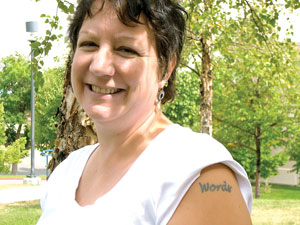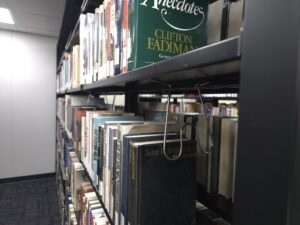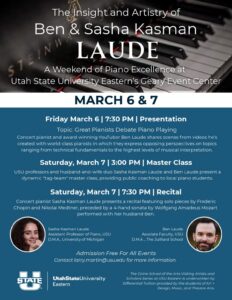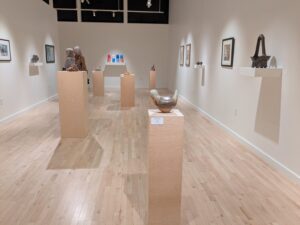Life outside of school and teaching is the same, “I write”
“I’m a poet and I am someone very interested in literature, art and teaching,” admits College of Eastern Utah’s newest member of the English faculty. Patricia Dyjak earned a bachelor’s, three masters and a doctorate degree before recently being hired at CEU.

This archived article was written by: Lindsey Sweat
“I’m a poet and I am someone very interested in literature, art and teaching,” admits College of Eastern Utah’s newest member of the English faculty. Patricia Dyjak earned a bachelor’s, three masters and a doctorate degree before recently being hired at CEU.
Dyjak received her Bachelor of Arts’ degree in English at Rutgers University. She then went on to receive two Master of Arts, one in English language & literature at the University of Virginia and the other in women’s studies at the University at Albany and State University of New York. Her Master of Fine Arts in creative writing was earned while attending Western Michigan University and she finished it all up after receiving her Ph.D. in English at the University of Albany and State University of New York.
Life outside of school and teaching for Dyjak is still focused on that same passion, “I write. I’m a poet. I’ve published a number of individual poems. I still don’t have a book out; I’ve been trying. I have a manuscript and I do have poems piling up for the next one.”
Dyjak explains the inspiration for her poems, “I get very excited by ideas and I also get very excited by sound. In my poems you will see there are ideas that kind of creep up, but also very much the music of the lines. I used to play flute way back when and I grew up hearing classical music, my father was a very big classical music fan. In the high school band there were just a gazillion flutes and drummers so they put the drums in the back and the flutes in front of them. So every time in marching band I got to hear these great drums, and when you’re marching you’re moving and that’s rhythm again, and that’s a big part of my poetry, playing with that rhythm.” This style is shown in her poem titled Zero, the Gloryless:
Zero, the Gloryless
I imagine
that in seven ways
each seventh day
the earth diminishes
a little, its speed decreased by the infinitesimal
friction of its constant spinning.
Oh! There is not space on the page for that long
number,
for all those lovely zeros,
which do not mean “nothing”
but mean, instead:
“I push the air aside, shove
the ground around. I am here by this one.” – the way
studs in walls support the house without glory.
Gloryless zero defines
delineates and means something non-noun.
In Navajo, where grammar is verb based,
perhaps zero might be better understood
than in English-American syntax.
All meaning not in things
but in connections:
I am writing
to you.
I am speaking
to you.
You may be listening
to me.
If you are,
then zero
is our willingness and the space we reach across.
P.R. Dyjak
Besides writing, Dyjak confesses another favorite hobby. “I swim laps! In fact they’ll tell you here in the English department that it kind of marked me in my interview that after all the official questions, I asked if there was a pool because I couldn’t seriously consider going someplace if I couldn’t swim!” So of course one of her favorite places to vacation would be the ocean. “I love the ocean, which is kind of strange because I’ve spent so much of my time in landlocked places. I lived in Michigan and Wisconsin, although Madison, Wisc., has lots of big lakes right there. I do like going to the ocean. I love playing out in the water, walking along the beach, and I’m always reading.”
“Oh! You’ve heard I have a tattoo,” Dyjak laughs, “yes, it’s ‘WORDS’.” Pulling up her left sleeve to reveal a light blue tattoo, WORDS, she explains, “I had been thinking about it for awhile and as a poet and as a person interested in literature, we’re looking at how words operate. As a poet I’m interested in the music of words. Every word has a beat. In music you look at the stressed and unstressed syllable, well every word has that, so every word has music because they have rhythm. That gets me excited when I’m looking at literature and when I’m writing. When I did my doctoral examination, which was just the hardest thing I’ve ever done, I was like ‘okay I have to mark this event and I have to finally go get that tattoo’.”
Looking back on her past jobs, she describes herself as having led the life of a poet. “I have had every kind of job you can think of. Before I went back for my Ph.D., I was working as a part-time editor, teaching part time and doing part-time clerical work, like three or four different jobs at a time. You name it, I’ve done it. As a poet I’m always writing my poetry so if I need to work, it’s not my identity. I feel extremely lucky to be teaching right now because I do enjoy it so much and I feel very lucky to be here. But other times when I have a job that’s not really using a lot of skills or anything, I’m like well any work is honest work. You meet different people. It’s fascinating to see how other people live, and just to talk to folks. I don’t know if that’s a poet thing or a writer’s thing, it’s just interesting to see what people do with their lives.”
After having been all over the country Dyjak explains her reason for choosing to come teach in Utah at CEU, “Well, I finished my Ph.D. and I went on the job market. When I taught in Wisconsin at a liberal arts college I really enjoyed it there. They focused on teaching and that was very important to me, that classroom dynamic. I find it very exciting. I come out of a classroom and I feel like I’m jumping up and down, I have so much energy! I want to be at a small school. I don’t want to be at a big research institution that doesn’t care at all about teaching and are only going to be concerned with, ‘are you publishing something, are you publishing something?’ I want somebody that actually cares about creating a community and cares about what happens to the students.”
“I’m learning the ropes here, finding out how everything works. I’m certainly looking forward to the classes I’ve got. I just came from a really great English 2010 class. The students were all so engaged and interested and were so eloquent in talking about what they had read. It was a great time. I firmly intend to be here, that’s my plan.”




